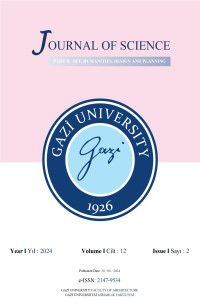Öz
Kaynakça
- [1] Ergenç, İ. (2019). Endüstriyel Miras Alanlarının Dönüşümünün Müzecilik Açısından İncelenmesi, Yüksek Lisans Tezi, İstanbul, İstanbul Üniversitesi Sosyal Bilimler Enstitüsü Müze Yönetimi Anabilim Dalı, İstanbul.
- [2] Aşar, E. (2021). Mersin-Adana Arasında D400 Karayolu ile İlişkilenen Endüstri Mirası Potansiyeli ve Leyland Kamyon Fabrikası Örneği, Yüksek Lisans Tezi, Mersin, Mersin Üniversitesi Fen Bilimleri Enstitüsü Kültür Varlıklarını Koruma Anabilim Dalı, Mersin.
- [3] Uysal, B., Manav, A. (Moderator), Ömeroğlu, M., İzgi, M., (12-13 Mart 2021), Tarsus Bölgesinde Endüstri Mirası (s. 64-95), Ege Sempozyumu, İzmir.
- [4] Tülücü, T.A., (2007). Adana Kenti Tarihi Endüstri Yapılarının Yapısal Analizi ve Korunması İçin Bir Yöntem Araştırması. G.Ü. Doktora Tezi, Ankara, 270s.
- [5] Mutlu N.E., (2018). Bir Devrim, İki Zıtlık: Tarihten Günümüze Endüstri Arkeolojisi. Arredemante Mimarlık, 326, 51-54.
- [6] Çanakkale, E. (2012), Endüstri Mirası Kapsamındaki Yapıların Korunarak Yeniden Değerlendirilmesinde Tasarımcı-Mekan Etkileşimi. Yüksek Lisans Tezi, İstanbul Teknik Üniversitesi, İstanbul.
- [7] ICOMOS(1987).WashingtonTüzüğü.http://www.icomos.org.tr/Dosyalar/ICOMOSTR_tr0627604001536681570.pdf
- [8] Endüstri Mirası Sitleri, Yapıları, Alanları ve Peyzajlarının Korunması İçin ICOMOS-TICCIH Ortak İlkeleri / DUBLIN İlkeleri (2011)
- [9] Saner, M. (2012) “Endüstri Mirası: Kavramlar, Kurumlar ve Türkiye’deki Yaklaşımlar”, Planlama 2012/1-2, 5-66.
- [10] Otamendi-Irizar, I., Azpiri Albistegui, A. & Eizaguirre-Iribar, A. Endüstriyel Mimari Mirasın Korunmasının Belgeleme ve Analiz Aşaması için Araştırma Metodolojisi: "Nueva Cerámica de Orio" Örneği. Tarih Kemeri (2024). https://doi.org/10.1007/s41636-024-00489-5
Öz
Industrial heritage; includes structures, areas, landscapes, ruins, and industrial processes that bear the technical, economic, and social characteristics of the period. All of these are unique elements in the formation of urban identity and local memory. The protection of industrial heritage, which was discussed in the second half of the 20th century, is a concept whose importance is known, as can be seen from the increasing examples in Turkey. This study aims to evaluate and examine the Yuvam Brick Factory, which is produced in Tarsus, within the scope of industrial heritage. Tarsus became a settlement that attracted the attention of foreign investors with its railway transportation and port trade in the late 19th century. Thus, the Mersin-Tarsus region became a settlement where factories were established. Industrial structures in the region are important for understanding the industrial and historical development of Tarsus.
Yuvam Brick factory was established in 1974 ended traditional brick manufacturing in 2016 and was demolished after the change of ownership in 2021. With this work done just before its demolition; brick kilns, lodgings, administration building, laboratory, security buildings, warehouse, workshop, machinery, and transformer rooms, award-winning balcony, a registered chimney, and official documents within the campus were identified. Evaluations were made to preserve the remaining units of the factory, other industrial structures in the region, archaeological findings, and traditional cultural heritage elements within the framework of a holistic plan. Thus, urban cultural memory will be maintained, and industrial heritage will be preserved and used by future generations.
Anahtar Kelimeler
Kaynakça
- [1] Ergenç, İ. (2019). Endüstriyel Miras Alanlarının Dönüşümünün Müzecilik Açısından İncelenmesi, Yüksek Lisans Tezi, İstanbul, İstanbul Üniversitesi Sosyal Bilimler Enstitüsü Müze Yönetimi Anabilim Dalı, İstanbul.
- [2] Aşar, E. (2021). Mersin-Adana Arasında D400 Karayolu ile İlişkilenen Endüstri Mirası Potansiyeli ve Leyland Kamyon Fabrikası Örneği, Yüksek Lisans Tezi, Mersin, Mersin Üniversitesi Fen Bilimleri Enstitüsü Kültür Varlıklarını Koruma Anabilim Dalı, Mersin.
- [3] Uysal, B., Manav, A. (Moderator), Ömeroğlu, M., İzgi, M., (12-13 Mart 2021), Tarsus Bölgesinde Endüstri Mirası (s. 64-95), Ege Sempozyumu, İzmir.
- [4] Tülücü, T.A., (2007). Adana Kenti Tarihi Endüstri Yapılarının Yapısal Analizi ve Korunması İçin Bir Yöntem Araştırması. G.Ü. Doktora Tezi, Ankara, 270s.
- [5] Mutlu N.E., (2018). Bir Devrim, İki Zıtlık: Tarihten Günümüze Endüstri Arkeolojisi. Arredemante Mimarlık, 326, 51-54.
- [6] Çanakkale, E. (2012), Endüstri Mirası Kapsamındaki Yapıların Korunarak Yeniden Değerlendirilmesinde Tasarımcı-Mekan Etkileşimi. Yüksek Lisans Tezi, İstanbul Teknik Üniversitesi, İstanbul.
- [7] ICOMOS(1987).WashingtonTüzüğü.http://www.icomos.org.tr/Dosyalar/ICOMOSTR_tr0627604001536681570.pdf
- [8] Endüstri Mirası Sitleri, Yapıları, Alanları ve Peyzajlarının Korunması İçin ICOMOS-TICCIH Ortak İlkeleri / DUBLIN İlkeleri (2011)
- [9] Saner, M. (2012) “Endüstri Mirası: Kavramlar, Kurumlar ve Türkiye’deki Yaklaşımlar”, Planlama 2012/1-2, 5-66.
- [10] Otamendi-Irizar, I., Azpiri Albistegui, A. & Eizaguirre-Iribar, A. Endüstriyel Mimari Mirasın Korunmasının Belgeleme ve Analiz Aşaması için Araştırma Metodolojisi: "Nueva Cerámica de Orio" Örneği. Tarih Kemeri (2024). https://doi.org/10.1007/s41636-024-00489-5
Ayrıntılar
| Birincil Dil | İngilizce |
|---|---|
| Konular | Mimari Miras ve Koruma |
| Bölüm | Mimarlık |
| Yazarlar | |
| Yayımlanma Tarihi | 30 Haziran 2024 |
| Gönderilme Tarihi | 26 Mart 2024 |
| Kabul Tarihi | 21 Haziran 2024 |
| Yayımlandığı Sayı | Yıl 2024 Cilt: 12 Sayı: 2 |


